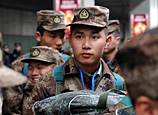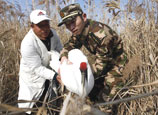
Third Class Sergeant Zhou Xiaofeng, 36-year-old armor technician with a armoured regiment of a mechanized infantry division under the Guangzhou Military Area Command (MAC) of the Chinese People's Liberation Army (PLA), has been elected as "Excellent Soldier" and "Top Soldier in Military Training" for many times and has been awarded the third-class merit for four times since he joined the army in 1994. This veteran who has been serving in the army for 18 years told the reporters the great changes in the barracks in his eyes.
Military uniform: from "yellow garment" to "pine green uniform"
I wore "yellow garment (87-type military uniform) and Jiefang ("liberation" in Chinese) shoes" throughout the year when I joined the army. Afterwards, 97-type military uniform was issued and the non-commissioned officers could wear leather shoes, for which we felt only too glad. Nowadays, we wear 07-type military uniform which is beautiful and comfortable.
Military allowance: from 30 yuan to 600 yuan
I got an allowance of only 30 yuan in my first month in the army. Now, new recruits have an allowance of 600 yuan per month when they join the army, 20 times the level years ago. After being promoted to non-commissioned officers (NCO), they can get over 2,000 yuan per month, which amounts to the salary of an officer at the regiment level 10-odd years ago!
Meal: from "eat to fullness" to "eat well"
The soldiers in the barracks only wanted to eat their fill 10-odd years ago. When I joined the army, the same dishes were provided all the year round, especially in the winter when one-pot stewed Chinese cabbages, potatoes, radishes and bean vermicelli made us look sallow. Nowadays, the mess is equipped with television sets and sound equipment, nutritious meals are provided and vegetables and fruits vary from season to season.
Barracks: from stone-built barracks to standardized barracks
When I came to the army, I lived in a stone-built house with red tiles and slept on an adobe kang (a traditional bed of China). In winter, we had to make a fire to warm the kang. The toilet was 20-odd meters away from our dormitory. Bathing at that time was nothing but a tragedy, for there was only a large public bathing pool in the whole regiment and when taking bath in the pool we were like dumplings in a pot. Now, the stone-built houses have been changed into standardized barracks. On the roof there is also a solar water heater which can provide hot water 24 hours a day.
Recreation: from dullness to colorfulness
Playing either cards or basketball were the most common cultural and sports activities at that time. Later, the regiment managed to have a video recorder and every platoon raised money in turn to rent video disks. Now, squads and platoons have been equipped with television, telephone, computer, digital video (DV) and multifunctional sound equipment, and the soldiers can study and play at any time.
Equipment: from "manual operation" to "digitized operation"
At the beginning of my service in the army, type-59 tank was still the main combat equipment, featuring loading shells and aiming at targets manually, short communication distance, poor quality and limited anti-interference capability. Nowadays, the type-99 tank has realized automatic loading, laser ranging and aiming, data transmission by vehicle-mounted computer system and positioning and navigation by the Beidou Navigation Satellite System, and digital and intelligent weaponry and equipment have been equipped in the army.
Personnel: from "feed chicken" to "operate computers"
In my first few years in the army, a soldier with the background of senior middle school education was regarded as a "talent", and was often elected as the gunner of an infantry fighting vehicle (IFV) to operate highly-information-based weaponry and equipment. When recruits were assigned to companies, we were asked who could use computers, but I failed to understand that question and made a fool of my self by answering that "I can feed chicken" ("computer" sounds like "feed chicken" in Chinese). Nowadays, an increasing number of college graduates have joined the army, and computer operation has already become a basic skill.
















 Convenience-for-people measures for senior citizens in Beijing
Convenience-for-people measures for senior citizens in Beijing


![]()
